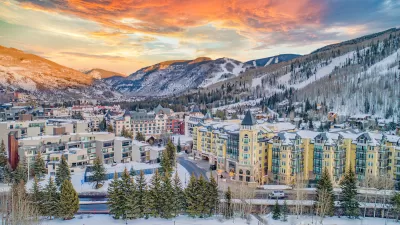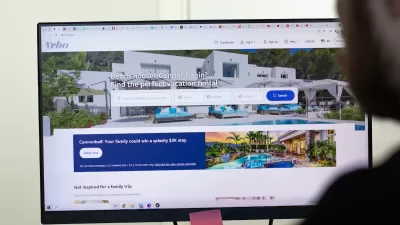The workers that keep many popular tourist destinations running find it more difficult to find affordable housing near their jobs as more remote workers move to scenic resort areas.

In an opinion piece in Governing, Rodney M. Milton Jr. argues that resort towns in states like Colorado “need to get serious” about housing affordability for their residents.
Some are being forced to move away from communities they've known all their lives. Others must live far away from their jobs, commuting through snowy mountain roads or catching a ferry home after a long day of work. The effect on the local economies is dire, with businesses unable to hire or retain staff because there's nowhere affordable for employees to live.
In Steamboat Springs, Colorado, the average home price jumped by 71 percent between 2019 and 2022. “In addition, many vacation communities saw a dramatic increase in units being converted to short-term rentals made available on platforms like Airbnb and Vrbo. Airbnb’s listings outside of big cities increased by almost 50 percent between 2019 and 2022.”
Some citied are taking action. “Vail, for example, developed Vail InDEED, an innovative program that protects and preserves existing homes in the community from conversion to vacation homes through the purchasing of a deed restriction that limits occupancy to local residents.” Private employers are also taking initiative by providing modular workforce housing that can be quickly deployed with seasonal cycles. For Milton, “New housing development can be controversial, but the demand is reaching a breaking point and communities need to accommodate a larger population.”
FULL STORY: Resort Towns Need to Get Serious About Affordable Housing

Planetizen Federal Action Tracker
A weekly monitor of how Trump’s orders and actions are impacting planners and planning in America.

Map: Where Senate Republicans Want to Sell Your Public Lands
For public land advocates, the Senate Republicans’ proposal to sell millions of acres of public land in the West is “the biggest fight of their careers.”

Restaurant Patios Were a Pandemic Win — Why Were They so Hard to Keep?
Social distancing requirements and changes in travel patterns prompted cities to pilot new uses for street and sidewalk space. Then it got complicated.

California Homeless Arrests, Citations Spike After Ruling
An investigation reveals that anti-homeless actions increased up to 500% after Grants Pass v. Johnson — even in cities claiming no policy change.

Albuquerque Route 66 Motels Become Affordable Housing
A $4 million city fund is incentivizing developers to breathe new life into derelict midcentury motels.

DC Area County Eliminates Bus Fares
Montgomery County joins a growing trend of making transit free.
Urban Design for Planners 1: Software Tools
This six-course series explores essential urban design concepts using open source software and equips planners with the tools they need to participate fully in the urban design process.
Planning for Universal Design
Learn the tools for implementing Universal Design in planning regulations.
Heyer Gruel & Associates PA
JM Goldson LLC
Custer County Colorado
City of Camden Redevelopment Agency
City of Astoria
Transportation Research & Education Center (TREC) at Portland State University
Camden Redevelopment Agency
City of Claremont
Municipality of Princeton (NJ)





























